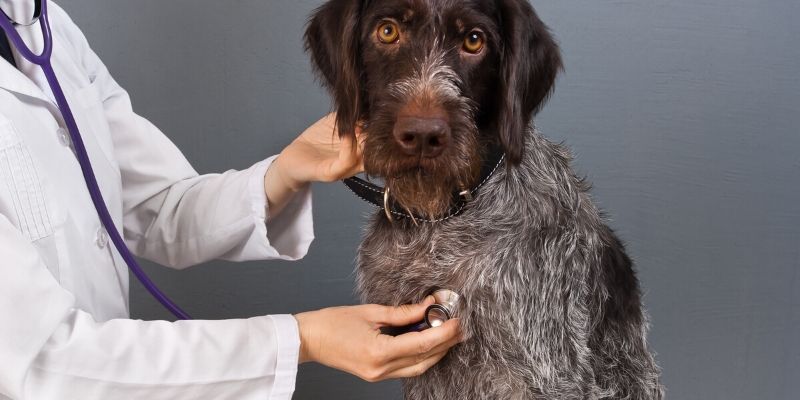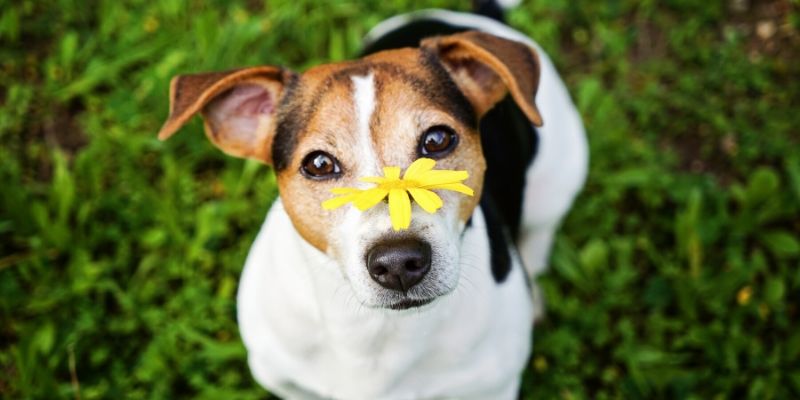Dog sneezing … is it just a funny noize your dog makes or a serious reason to be concerned about pup’s health? Let’s try to learn all about it.
Do you have a specific question about the subject? Then use the table of contents below to jump to the most relevant section. And you can always go back by clicking on the black arrow in the right bottom corner of the page. Also, please note that some of the links in this article may be affiliate links. For more details, check the Disclosure section at the bottom of the page.
Why is dog sneezing?
Usually, our dogs don’t sneeze for the same reasons that we do. For example, they can do it when they get excited or happy. There can be an allergen in the nose, like dust, household products, perfume, or even pollen.
Sometimes a dog is going to “reverse sneeze,” a respiratory phenomenon that isn’t really a sneeze at all (though it seems like it). Sneezing can be health-related, too, occasionally. Typical reasons for persistent sneezing in dogs include foreign bodies in the nose (including foxtails), nasal Aspergillus infections, nasal mites, and nasal tumors.

In which cases is dog sneezing normal?

Since sneezing in your pup may mean a lot of different things, it is crucial to pay attention to the context. Unlike humans, it is also fairly common for pets to sneeze as a way to express emotion. This is a bit confusing, but there’s no problem with a few excited sneezes. Even a spontaneous sneeze once or twice a day is likely to be healthy.
If your pet is sneezing more than that, it might be a good idea to watch it for a while.
Pay close attention to the duration of the sneezes. And also to the color of the discharge. All that date will help to diagnose the problems if there are any.
You might also like:
- Doghint’s secret guide on getting FREE dog food
- 9 most desirable gift ideas for dog owners
- Dog Subscription Guide. We really found one under $10.

Is sneezing a sign of kennel cough?
Kennel cough is one of the most frequent illnesses for dogs to have. It’s a highly contagious illness that is somewhat similar to the common cold in humans. Even though occasional sneezing can occur if your pup suffers from kennel cough, the most common symptoms are runny nose and eyes, and dull-looking eyes.

What does it mean if…
…dog sneezing uncontrollably
Allergies or nasal discomfort is the most likely reason for this, particularly with early spring. Possible causes of excessive sneezing include allergies, viruses, and inhalation of some dust, pollen, etc. The same household chemicals that induce sneezing in humans can also cause dogs to sneeze. Indoor irritants such as pesticides, cigarette smoke, household cleaners, aerosol deodorants, etc., can cause sneezing in sensitive dogs.
…dog sneezing when playing
Dogs, especially small dogs, often sneeze when they play or are excited, and this is completely normal. It’s their way to tell that they’re having fun. If your dog only sneezes while playing, you have no reason to be worried about it.
…dog coughing and sneezing
Coughing followed by sneezing may be an indication that your dog is impacted by a dog’s cough. Where there any other signs, too? Like a lack of appetite, a runny nose, a fever? It’s time to see your vet.
…dog sneezing a lot and shaking head
One of the common reasons, in this case, might be that foxtail planted itself somewhere in your pup’s body. Embedded foxtails can cause discharge, abscesses, swelling, pain, and even death. Sneezing and shaking head are amongst the symptoms you want to look up if you suspect that your pup is suffering for foxtails invasion.
…dog sneezing and gagging
Typical reasons, in this case, might be:
- Foreign objects stuck in the throat, esophagus or mouth, including bone fragments, string, or plant parts
- Inflammation of the nasal passage or throat
- Nasal passage blockages, including mucus and mites
- Bronchial, nasal and sinus infections, which are quite typical if your dog wasn’t vaccinated
- Pneumonia and canine influenza
…dog sneezing blood
This may be caused by an allergy or foreign substance, such as pepper, which may harm your dog. If bleeding starts during a severe round of sneezing and does not persist long after that, it may not be serious.
Nonetheless, you must be conscious that many illnesses are followed by sneezing and bloody discharge. The build-up of fungi or bacteria can trigger your dog to sneeze blood, even though the disease has cleared up. If the infection has not been treated, it is usually relatively easy to cure with antibiotics or anti-fungal medications.
Still, many causes of bloody discharge are quite severe and even can be an indication of several types of cancer. Tooth abscesses can also cause nasal bleeding, but this will typically be just from one nostril.
…elderly dog sneezing a lot
Older dogs sometimes develop tumors in the nasal cavity. Tumors can trigger sneezing or sniffing, runny nose, or bleeding from one nose. Some tumors can also obstruct the flow of air, making it harder for the dog to breathe. Longnose dogs are especially vulnerable to nasal cancer.

Home remedies for dog sneezing
Here are several steps to follow before going to see a vet:
- Calm your dog down.
- Take pet’s temperature: If it higher than 101-102 degrees, take him to your veterinarian immediately.
- Confine him: Lock your pet in a small room to watch his behavior and symptoms along with any discharges color and texture.

When should I take my dog to the vet for sneezing?
Be sure to visit your vet right away if you notice that your dog’s sneezing is paired with:
- Changes in appetite
- Changes in behavior or activity level
- Difficulty in breathing
- Nasal discharge, especially if it’s green or yellow
- Coughing with or without blood
- Runny eyes or dull-looking eyes
Come ready for the vet. You need to share all the details about the symptoms of your cat. You may also want to ask your vet if they want you to leave your dog in the car before you meet to prevent other dogs from being exposed to germs.

Should I worry if my dog keeps sneezing?
Generally, sneezing without other symptoms is not a significant cause of concern. However, sneezing, combined with other symptoms, may suggest a myriad of different diseases. If your pet is sneezing all the time, and it’s followed by fever, swelling, or blood in the urine, etc., it is best to consult your vet immediately.
Thanks for the blog graphics: Canva.com


